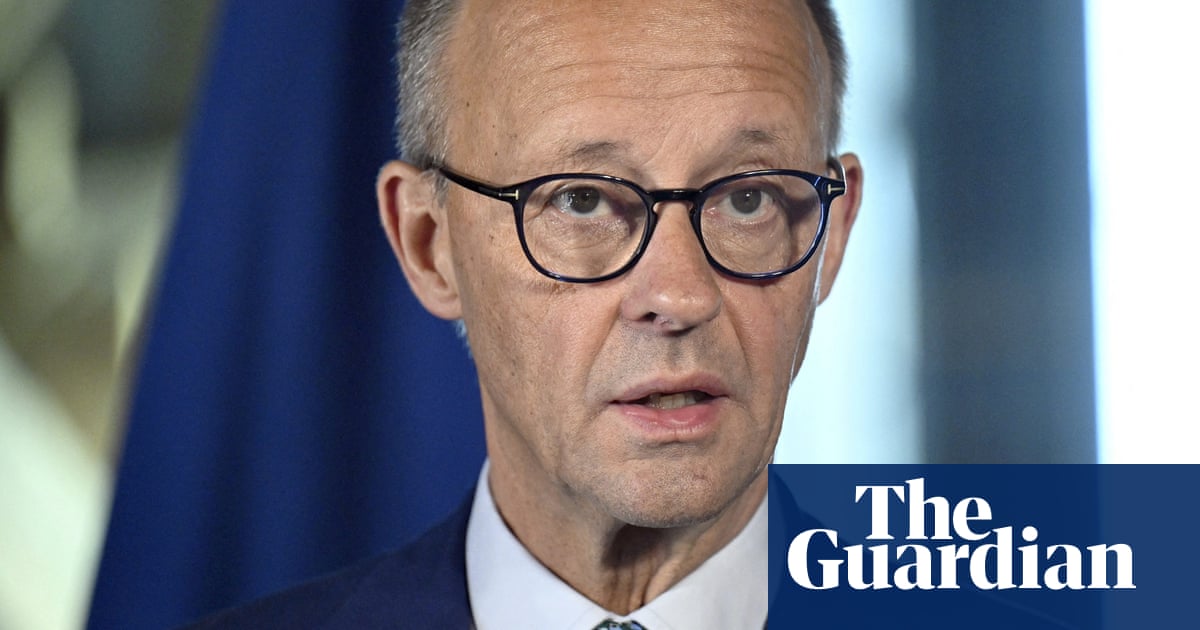The German chancellor’s drive to keep a campaign pledge of more robust backing for Ukraine is running into blocks within his own government as he prepares to welcomeVolodymyr Zelenskyyto Berlin.
Friedrich Merz made a full-throated declaration on Monday, hours before Zelenskyy’s one-day visit was announced, that Germany was for the first time lifting previous range restrictions on weapons supplied to Kyiv, along with Ukraine’s other main western supporters.
His statement – in an interview with a public broadcaster, which his team later posted to social media – was widely interpreted as a pivot toward bolstering Berlin’s aid to Kyiv at a time of devastating aerial bombardment by Russia.
It drew immediate condemnation from Moscow and invited speculation it could bea prelude to Germany announcing it was sending long-requested Taurus missiles to Ukraine, possibly as soon as at the Zelenskyy talks on Wednesday.
However, on Tuesday, Merz, of the conservative Christian Democratic Union, appeared to finesse his message as he faced criticism from his coalition partners, the centre-left Social Democrats.
Far from a groundbreaking new policy, Merz said, permission forUkraineto strike military targets inside Russian territory using weapons supplied by western allies had been granted previously after an extensive debate.
“Hence yesterday in Berlin I was describing something that already happened months ago,” he said.
Ukraine already fired British-made Storm Shadow missilesinto Russia last November, as well as French Scalps and USAtacms.
Germany has delivered only two weapons systems to Ukraine that could be used to attack Russian positions beyond the border: Mars II rocket launchers and PzH 2000, a self-propelled howitzer. Range restrictions on both were lifted in May 2024.
The Kremlin had said on Monday that any new decision to scrap range limits was “quite dangerous” and “contrary to our efforts to reach a political settlement”.
Merz’s initial comments also drew criticism from leading Social Democrats.
MP Ralf Stegner, an SPD foreign policy expert and frequent critic of arms shipments to Ukraine, called the remarks “not helpful” and “wrong” and demanded redoubled “diplomatic efforts”.
Vice-chancellor Lars Klingbeil of the Social Democrats insisted there was “no new agreement that goes beyond what the previous government did” on range restrictions.
The Russian foreign minister, Sergei Lavrov, used the confusion over Merz’s initial remarks to question the calibre of people who had risen to power in leading European countries, Reuters reported.
Merz “said yesterday with such pretentiousness that from now on and forever there are no restrictions on the range of strikes” before placing the policy in context, Lavrov told reporters at a meeting in Moscow with the Turkish foreign minister, Hakan Fidan.
Asked aboutDonald Trump’s commentthat Vladimir Putin had “gone absolutely crazy” with the latest offensive, Lavrov said that the US president was showing “emotion” as he was watching his efforts for peace in Ukraine sabotaged by European politicians.
In what Ukraine called a weekend of “terror”,Russia battered Kyivover three nights with massive air attacks, fuelling calls from western partners for an immediate ceasefire.
However, Merz said on Tuesday that a halt to the fighting appeared far out of reach, despite Russian and Ukrainian officials holding direct talks for the first time in three years earlier this month.
“Wars typically end because of economic or military exhaustion on one side or on both sides, and in this war we are obviously still far from reaching that,” Merz said at a joint news conference with the Finnish prime minister, Petteri Orpo, in Turku.
Sign up toThis is Europe
The most pressing stories and debates for Europeans – from identity to economics to the environment
after newsletter promotion
“So we may have to prepare for a longer duration.”
Merz has already met Zelenskyy twice this month, in Kyiv and at a summit of European leaders in Albania.
The talks in Berlin are aimed at discussing possible further direct discussions between Ukrainian and Russian officials, and to inform Zelenskyy about a new planned EU sanctions package against Russia, Der Spiegel and Süddeutsche Zeitung reported.
Before taking office three weeks ago, Merz had hammered his Social Democrat predecessor, Olaf Scholz, as being far too timid in his defence of Ukraine against the Russian onslaught.
Scholz’s three-way coalition strongly backed Kyiv but stopped short of sending it long-range Taurus missiles, citing concerns it could heighten tensions with nuclear-armed Moscow.
Merz’s new government has stressed Germany, the second biggest national supplier of weapons to Ukraine after the US, would no longer publicly detail what arms it was sending to Ukraine, opting for a stance of “strategic ambiguity”.
The secrecy, however, is unlikely to paper over differences between the ruling parties over military aid.
Despite Merz’s repeated calls as opposition leader and during the campaign ahead of February’s general election to send Ukraine Taurus missiles, which have a range of 500 km, SPD leaders have made clear that they would, at least for now, veto such a move.
Moscow, which has repeatedly rejected proposals from Kyiv and its western allies for a 30-day unconditional ceasefire and fired hundreds of drones at Ukraine between late Friday and early Monday, killing more than a dozen people.
The Kremlin insisted on Monday that Putin was simply taking measures “necessary to ensure Russia’s security”.
Merz is expected to travel to Washington next month for his first meeting as chancellor with Trump, who has positioned himself as a go-between to broker an end to Moscow’s three-year offensive.
European leaders are working to win steadfast support from the US presidentfor sanctions against Russia after conflicting messages.
